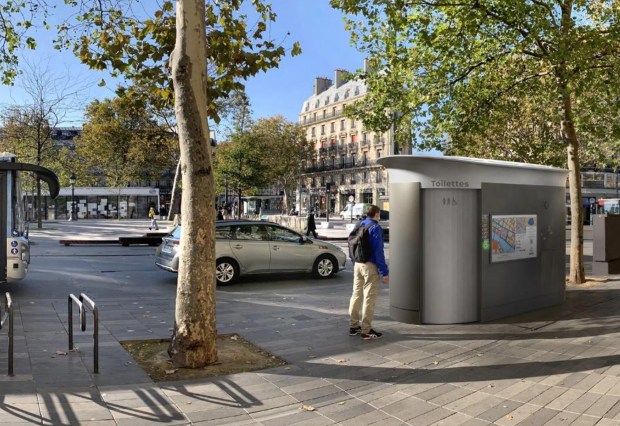For many homeless people in Chicago, finding a restroom often requires walking a long distance. Many restrooms in businesses are only available for customers and public ones are few and far between, an issue Ali Simmons said was brought to the forefront during the COVID-19 pandemic.
“It’s definitely humiliating, embarrassing. (Unsheltered people) see it as a necessity,” said Simmons, a case and street outreach worker with the Chicago Coalition for the Homeless.
The city is now on track to install new public bathrooms, according to an alderman, more than two years after a Tribune investigation found there were fewer than 500 structures throughout Chicago that contain free public restrooms with few or no barriers to entry, such as security checkpoints or client-only access.
Ald. Daniel La Spata, 1st, told residents in a newsletter that JCDecaux is prepared to install four “high quality” public bathrooms as part of the French company’s contract with the city. Block Club Chicago was the first to report the announcement.
JCDecaux has designed a “self-cleaning public toilet,” saying on its website that they’re used in 28 countries and are fully funded by advertising on street furniture, such as the bus shelters the company operates in Chicago.
“I’m excited to see the city work with such an experienced operator and hopeful that we can determine appropriate locations in the very near term,” La Spata said. “It’s a great opportunity to bring new services to our residents!”
The 1st Ward’s office said in a statement that La Spata is collaborating with JCDecaux, Mayor Brandon Johnson’s administration and the City Council’s Committee on Health and Human Relations on details related to the restrooms’ installation, including where they will be located, and will “have a more substantive update soon.”
The mayor’s office and JCDecaux did not respond to requests for comment.
Simmons said putting the restrooms near homeless encampments would be helpful, particularly in the Loop. He said he’d also recommend gender-specific, rather than gender-neutral, restrooms for safety. Hand-washing stations would also make a good addition, he added.
“A lot of times we go past parks, and we see encampments in different parks, but the corresponding restroom areas are not open,” Simmons said. “So they’re pretty much left to their own way of figuring out how to use the washroom.”
Simmons said while these additions are a step in the right direction, the city needs to add more than four public restrooms. It’s a matter of “decency,” he said.
“You don’t want to have people out here using the bathroom in public places, and that also contributes to public complaints about health and safety issues that’s coming from the unsheltered population,” he said.
La Spata initially proposed a resolution in 2021, co-sponsored by Ald. Rossana Rodriguez-Sanchez, 33rd, that called on the City Council to develop a pilot program to provide publicly available bathrooms. More than 20 organizations and state officials backed the resolution, including the Chicago Coalition for the Homeless and Arab American Family Services.
“What jumps out for most people is that this is related primarily to homelessness, but really it’s for all Chicagoans,” La Spata said in an interview at the time. “Anyone who’s out for a run, any parent who’s out with their child … and had an emergency need and felt like they had no options, this is a resolution promoting a solution for you.”
The resolution cited the Tribune’s reporting, which found in 2021 that many sections of Chicago contained few or no public restrooms, and that little information is available about the ones that do exist. In the Magnificent Mile shopping district, for example, the Tribune couldn’t identify any publicly maintained toilet facilities from the north side of the Chicago River to Chicago Avenue.
It also found that few of the city’s public facilities are open overnight, except at police stations, and that dozens close during the fall and winter months. Chicago police officers issued at least 29,000 tickets for public urination and defecation from 2016 to 2021, predominately in communities on the South and West sides.
“We need (public restrooms), need them real bad,” Marcus Carter, who experienced stretches of homelessness over 13 years, told the Tribune.



